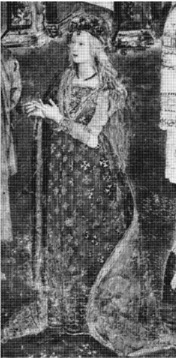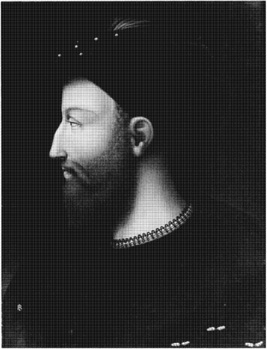A World Lit Only by Fire (16 page)
Read A World Lit Only by Fire Online
Authors: William Manchester

Yet it was obvious that there was more to Madonna Lucrezia, as the Vatican court called her, than her celebrated sexuality.
Fluent in Tuscan, French, and Spanish, she read classical Greek and Latin, had been educated in manners and style, could engage
in lengthy learned discussions, and was an accomplished poet. It seems equally clear that she was vulnerable; beginning in
her childhood she had been enveloped in her father’s love, and she suffered from an almost fatal compulsion to please. By
all accounts she was exceptionally comely. A contemporary described her as “a woman of great loveliness.” That was women’s
impression of her. Men thought her ravishing.
Under the supervision of Giulia Farnese, her father’s mistress, she devoted herself to what Jakob Burckhardt, the nineteenth-century
Swiss historian, called Italy’s “national pastime for external display.” In her youth she was called
dolce ciera
(sweet face) because of her innocent expression. Bernadino di Betto di Biago (Pinturicchio) captured that artlessness in
his portrait of her, painted in her early teens, and the debauchery and lewd excesses which followed do not seem to have altered
it. Her most spectacular feature was her long golden hair, which reached to her feet. To enhance its beauty, she washed it
using a formula set out in
Esperimenti
, a book compiled by Caterina Sforza. This was a diluted solution of honey, black sulfur, and alum. It was reported to guarantee
a shade called
filo d’oro
.
Lucrezia was said to have inherited her father’s lustiness at an early age, and her tales of her orgasmic exploits had made
her a Roman legend long before she became, at the age of twenty-one, the duchess of Ferrara. By her seventeenth birthday,
she was wise beyond her years. This was perhaps inevitable. Her holy and biological father used her beauty and her sexual
appetite as pawns. Papal politics made strange bedfellows for Alexander’s daughter. He had wed her to her first husband, Giovanni
Sforza, lord of Pesaro and a member of a powerful Milanese family, when she was thirteen and he was negotiating against the
Aragonese dynasty of Naples. Then, using his powers of annulment, he moved her from one marriage to another, depending upon
which alliance he was forming.
Left to her own devices in the palazzo of Santa Maria in Portico, built near the Vatican by Battista Cardinal Zeno, she is
reported

Lucrezia Borgia (1480–1519)
to have spent her time between marriages making an obsessive study of dalliance, seeking to expand the outer limits of lewd
pleasure. All the situations, positions, and groupings of participants found in pornographic books and films have been attributed
to Lucrezia’s lustful imagination. But there must have been more to it than that. The men around her were dissolute. Knowing
that they regarded her as a sex object, and wanting to be what they wanted her to be, she may have cultivated debasement.
To the degree to which that is true, the consequences for the men in her immediate family—her father and two brothers —
were to be both profound and sensational.

O
NLY
C
ESARE
B
ORGIA
(1475–1507) could have been fit, or unfit, to be Lucrezia’s most notorious brother—Cesare, the handsome cardinal who became
a multiple murderer while wearing the robes of a prince of the Church. His homicidal career began in his youth and continued
to the day he himself was slain in a skirmish outside Viana. Yet—and here he was very much a figure of his time—Cesare
was no brute. Dapper, eloquent, and even more erudite than his sister, he was a master of the cruel, perfidious politics of
his time—was, in fact, the model for Niccolò Machiavelli’s
Il principe
. Machiavelli could not approve of Cesare, but he found him fascinating. And so he was, though the qualities that made him
so were hardly endearing.
The circumstances surrounding the death of his elder brother, Juan, duke of Gandía, are the murkiest in the annals of his
sinister family, and impossible to confirm. If what was believed then is true, they are also the most sordid. The crime began
with Alexander himself. In 1497, the pope, manipulating his daughter in his remarkable fashion, decided to divorce her from
Sforza. Knowing his father-in-law, Lucrezia’s first husand fled Rome, fearing for his life. In Milan, however, he seethed.
The pope had publicly called him impotent. That being a grave insult in Italy, Sforza—who later fathered children—shouted
out what all Rome suspected but none had dared whisper: that the Borgia pope’s real motive was incestuous, that he wanted
his captivating daughter, not remarried, but active in his own bed.
Even for those times, this was scandalous. The rejected husband’s family was powerful enough to protect him, which made the
pontiff’s position extremely awkward. If he kept Lucrezia near the Vatican and discouraged suitors, no one in Rome would doubt
that he was spending his nights in her bed; that was consistent with both his reputation and hers. Intimations of lecherous
desire on his part were accurate. His daughter had just turned seventeen and was at the height of her beauty. We now know
that he was, in fact, her lover. Whether or not that was known in Milan is another question. In any event, he didn’t brave
it out, which would have been in character; instead he hastily prepared to find a new, politically suitable husband for her.

Cesare Borgia (1475–1507)
Here, however, the tale darkens. Romans had scarcely absorbed the news that the father lusted for his daughter when they heard
even more shocking gossip. Lucrezia was said to be unavailable to her father because she was already deeply involved in another
incestuous relationship, or relationships—a triangular entanglement with both her handsome brothers. The difficulty, it
was whispered, was that although she enjoyed coupling with both of them, each, jealous of the other, wanted his sister for
himself.
On the morning of June 15, 1497, Juan’s corpse was found floating in the Tiber mutilated by nine savage dagger wounds. Cesare’s
guilt was immediately assumed—he was a killer, and known to be jealous of his brother for other reasons—and the longer
the mystery remained unsolved, the more certain his guilt seemed. History may take another view; Juan, like all Borgias, had
other enemies. But myth has a significance all its own. At the time, the only Borgia to emerge unscathed was Lucrezia, whose
reputation, by then, was beyond redemption.
It touched bottom with the birth of her illegitimate son Giovanni, the so-called
Infans Romanus
, when she was eighteen. She had conceived the child between marriages, during intercourse with either her father or her surviving
brother. We know she had caught the seed of one of them because the pope, deciding to legitimatize his daughter’s child, issued
two extraordinary bulls September 1, 1501. The first, which was made public, identified the three-year-old boy as the offspring
of Cesare and an unmarried woman (“
coniugato genitus et soluta
”). Using Cesare’s name permitted Alexander to evade canonical law, which would have prevented him from recognizing a bastard
child fathered by him during his pontificate. The second, secret bull acknowledged Giovanni to be the son of the pope and
the same woman (“…
non de praefato duce, sed de nobis et de dicta muliere
”).
Alexander had named the boy a duke and awarded him the duchy of Nepi and Camerino. It is possible that he had accepted paternity
to prevent Cesare from getting his hands on the duchy lands, though historian Giuseppe Portigliotti has suggested another
reason for the two bulls—that Lucrezia herself, engaging in double incest, may not have known which of her two lovers was
the child’s father. Rome assumed that the Holy Father was. Actually, the Borgias would have preferred that the public be unaware
of Giovanni’s existence, and while he was still a fetus plans had been made along those lines. Before Lucrezia had begun to
show, she had entered the Convent of San Sisto on the Via Appia, expecting to wait out her pregnancy as a nun. It was impossible.
Instead of her finding anonymity in the nunnery, the nunnery, with her present, became notorious. She had brought another
of her lovers, a young Spanish chamberlain, with her. The other nuns, an Italian historian wrote, showed themselves “deplorably
susceptible” to the example set by their eminent colleague. Indeed, they went so far in “abandoning the old austerity of their
regime” that after her departure “sweeping reforms were necessary to bring them back to the sublime joys of self-mortification
and to exorcize the atmosphere … which had grown up inside those pious walls.”
However, it was her father’s ambitions which had exposed Lucrezia’s pregnancy to the world. He was arranging a politically
advantageous new marriage for her. Later it would end tragically when Cesare murdered the groom, but then it seemed worth
pursuing. To that end, she had had to appear at the Lateran Palace on December 22, 1497, for a ceremonial annulment of her
ties to Sforza, to be justified on the ground their union had never been consummated. The pope had decided that once the infant
was born, Lucrezia could pass him off as her baby brother—as indeed she did for the rest of her life. Her third husband,
heir to the dukedom of Ferrara, knew better, but didn’t care; his family was accustomed to the mingling of its legitimate
and illegitimate children. However, in 1497 that lay in the future. As the Lateran ceremony approached, Vatican servants spread
stories of Lucrezia’s coital bouts with her father and brothers. A curious crowd flocked to the palace, and there they saw
that the pontiff’s daughter, despite her loose, full skirt, was six months with child. When the canonical judges delivered
their judgment, solemnly declaring her
intacta
—a virgin—laughter echoed throughout the old halls. Jacopo Sannazaro, the Neapolitan humanist, wrote an epigram in the
form of a Latin epitaph:
Hoc tumulo dormit Lucretia nomine, sed re
Thais, Alexandri filia, sponsa, nurus
.
*
Here lies Lucrezia, who was really a tart
,
The daughter, wife, and daughter-in-law of Alexander
.
